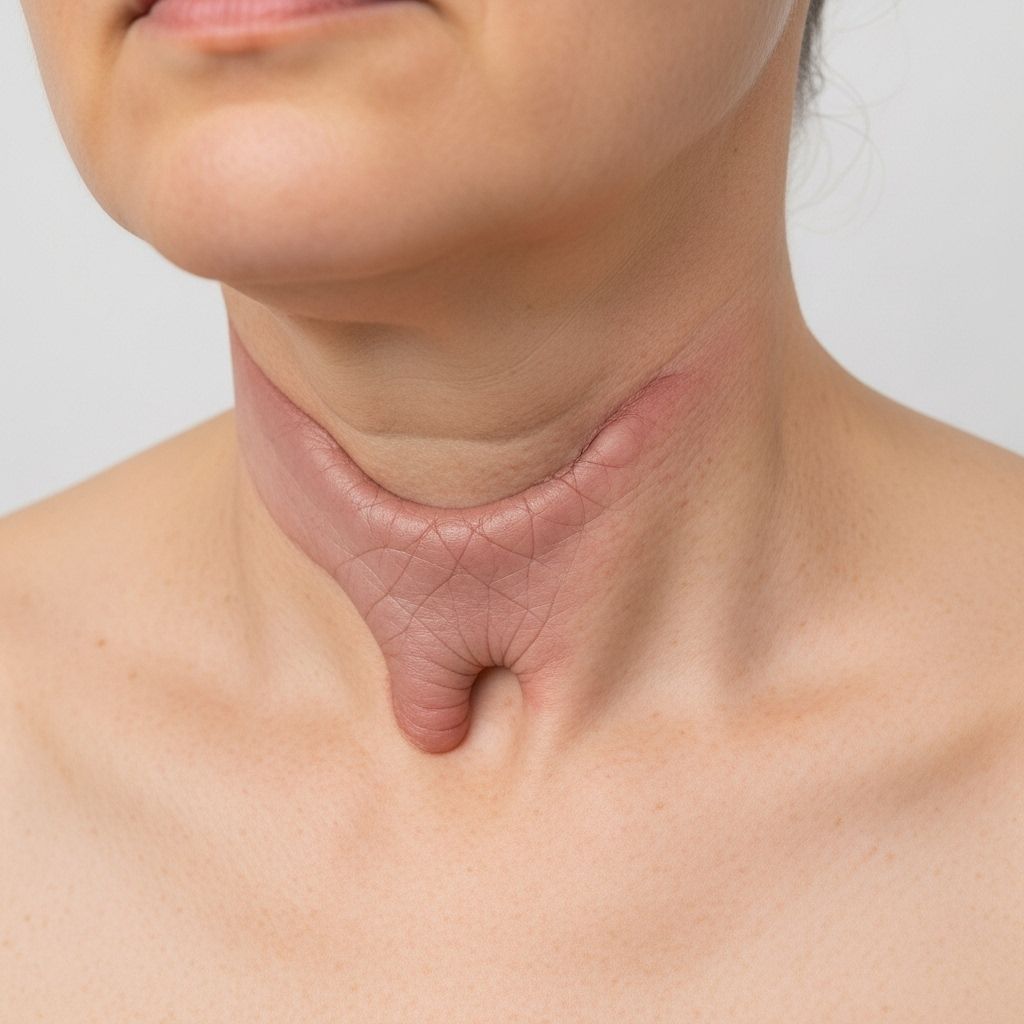Thyroid Health & Skin Circulation Problems
Balancing hormones enhances blood flow and hydration for a revitalized complexion.

Table of Contents
- Introduction
- Thyroid Hormones and Skin Health
- Skin Circulation Problems in Thyroid Disease
- Symptoms of Thyroid-Related Skin Problems
- Treatment and Management
- Frequently Asked Questions
Introduction
Thyroid hormones play a crucial role in maintaining overall body health, including the health of the skin. The thyroid gland produces thyroid hormones, primarily thyroxine (T4) and triiodothyronine (T3), which are essential for regulating metabolism, growth, and development. This article explores the relationship between thyroid health and skin circulation problems, highlighting the effects of thyroid hormones on skin health and how thyroid disorders can lead to skin-related issues.
Thyroid Hormones and Skin Health
Thyroid hormones exert significant effects on skin health through various mechanisms. They regulate epidermal cell proliferation, differentiation, and homeostasis by binding to thyroid hormone receptors (TRs) in the skin. These receptors are crucial for maintaining skin architecture and function, influencing processes such as hair growth, wound healing, and keratinocyte proliferation. Thyroid hormone signaling is mediated by the interaction of thyroid hormones with their receptors, which can either stimulate or inhibit gene expression.
- Role in Development and Regeneration: Thyroid hormones are vital for fetal epidermal differentiation and the establishment of the skin barrier during embryogenesis. They also play a role in skin regeneration by modulating keratinocyte proliferation and differentiation.
- Influence on Hair Growth: Thyroid hormones are known to influence hair growth. Both hyperthyroidism and hypothyroidism can lead to changes in hair texture and growth patterns.
- Effect on Skin Barrier Function: Thyroid hormones are involved in the regulation of the skin barrier function. In hypothyroidism, impaired barrier function can lead to skin issues such as dryness and roughness.
Skin Circulation Problems in Thyroid Disease
Thyroid diseases, primarily hyperthyroidism and hypothyroidism, can lead to skin circulation problems due to the hormonal imbalances they cause. Hyperthyroidism is often associated with increased blood flow and heat, which can cause skin symptoms like flushing and excessive sweating. Conversely, hypothyroidism can lead to decreased circulation, resulting in cold and pale skin.
Hyperthyroidism and Skin Circulation
In hyperthyroidism, the increased metabolic rate leads to higher blood flow and heat production. This indirect effect causes vasodilation, which is a response to the hyperthermia of internal organs rather than a direct action of thyroid hormones on skin blood vessels. Common symptoms include hyperhidrosis, facial flushing, and palmar erythema.
Hypothyroidism and Skin Circulation
Hypothyroidism often results in decreased metabolic rate, leading to reduced blood flow and colder skin. The skin becomes dry, rough, and cool due to the accumulation of mucopolysaccharides and water retention, which can also affect skin circulation.
Symptoms of Thyroid-Related Skin Problems
Thyroid-related skin problems can manifest in various ways, depending on whether the thyroid gland is overactive (hyperthyroidism) or underactive (hypothyroidism). Common symptoms include:
| Condition | Symptoms |
|---|---|
| Hyperthyroidism | Thin skin, scalp hair loss, hyperhidrosis, facial flushing, palmar erythema, pruritus, urticaria |
| Hypothyroidism | Dry skin, cold skin, alopecia, diffuse myxedema |
Treatment and Management
Treatment of thyroid-related skin problems involves addressing the underlying hormonal imbalance. This typically involves medical therapy to regulate thyroid hormone levels.
- Hyperthyroidism: Treatment includes medications that reduce thyroid hormone production or block its effects on the body. Surgical removal of part or all of the thyroid gland may also be necessary in some cases.
- Hypothyroidism: Treatment usually involves thyroid hormone replacement therapy to restore normal hormone levels.
In addition to medical treatment, lifestyle changes can help manage skin symptoms. These include maintaining good skin hygiene, using moisturizers for dry skin, and avoiding excessive heat or cold exposure.
Frequently Asked Questions
Q: Can thyroid problems affect skin circulation?
A: Yes, thyroid issues can impact skin circulation. Hyperthyroidism can increase blood flow to the skin, while hypothyroidism can decrease it, leading to circulatory issues.
Q: How do thyroid hormones affect skin health?
A: Thyroid hormones regulate epidermal cell proliferation and differentiation, influencing skin barrier function, hair growth, and wound healing. Abnormal hormone levels can lead to various skin issues.
Q: What are the common skin symptoms of hyperthyroidism and hypothyroidism?
A: Hyperthyroidism often causes soft, warm skin, sweating, flushing, and pruritus. Hypothyroidism leads to dry, cold, and rough skin, with possible alopecia and myxedema.
Q: How are thyroid-related skin problems treated?
A: Treatment focuses on correcting the thyroid hormone imbalance. Medications or surgery may be used for hyperthyroidism, while hypothyroidism is typically managed with hormone replacement therapy.
References
- https://www.frontiersin.org/journals/endocrinology/articles/10.3389/fendo.2023.1167890/full
- https://pmc.ncbi.nlm.nih.gov/articles/PMC3749490/
- https://jamanetwork.com/journals/jama/fullarticle/320005
- https://pmc.ncbi.nlm.nih.gov/articles/PMC3219173/
- https://www.elsevier.es/en-revista-endocrinologia-nutricion-412-articulo-skin-changes-associated-hypothyroidism-S2173509313001165
- https://www.palomahealth.com/learn/hypothyroidism-hair-skin-nails
- https://www.apollo247.com/blog/article/thyroid-skin-issues-causes-and-tips
Read full bio of medha deb












